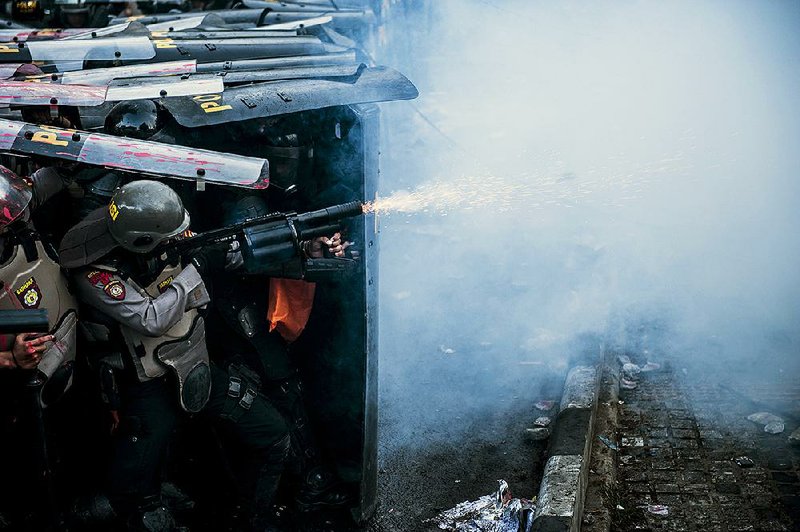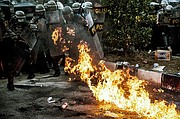JAKARTA, Indonesia -- Thousands of protesters gathered outside of parliament and in cities across Indonesia on Monday urging the nation's president to halt legislation aimed at crippling anti-corruption efforts and sharply reducing personal freedom.
The outgoing parliament attempted to rush through a series of contested bills with President Joko Widodo's approval before its five-year session ended Monday, and protesters fear the reintroduction of the measures after the new parliament is sworn in today.
Opponents say the measures would transform Indonesia into a less tolerant and more repressive society.
[Video not showing up above? Click here to watch » https://www.youtube.com/watch?v=f94RA0wdpvc]
One far-reaching measure, a proposed revision of the criminal code, would outlaw abortion except in cases of rape and incest, and would prohibit sex outside marriage, effectively banning gay and lesbian relations. It also would restrict free speech by strengthening laws on blasphemy and treason and making it a crime to insult the president.
Student-led protests, which began last week, compelled Widodo to put a hold on many of the bills, including the criminal code revision. But that is not enough for protesters, who want him to pledge not to let the crime bill return.
"The president said he would postpone it, but we want it canceled," said Rama, a 24-year-old student at Industrial Management Polytechnic who gave only his first name for fear of retribution. "We will protest until it is revoked."
The president also has balked at pulling back a law already approved by parliament that would limit the authority of the respected Corruption Eradication Commission, including its power to wiretap suspects and hire independent staff members.
Many Indonesians see government corruption as one of the nation's biggest problems and view the commission as one of the few entities that has done something about it.
At the same time, many members of parliament, fearful of getting caught up in one of the commission's investigations, have long wanted to limit its powers.
Widodo has the authority to revoke the corruption bill, subject to parliament's approval. Initially he said he would not pull it back, but later said he would consider doing so.
Widodo, who in April won re-election over his main opponent by 11 percentage points, campaigned on a platform of improving the economy. But after word spread that the president quietly supported measures to restrict personal freedom and the agency policing public officials, his popularity has plummeted, even as he prepares for his Oct. 20 inauguration to a second five-year term.
Members of the new parliament are expected to reintroduce the crime bill as well as measures that would make it easier for companies to exploit the country's natural resources.
The political composition of the new parliament is similar to the outgoing body.
Tens of thousands of protesters who took to the streets last week in Jakarta and other cities were met by aggressive police tactics, including water cannons and tear gas. Hundreds were injured, and hundreds more were arrested.
Two student protesters died on Sulawesi island in circumstances that remain unclear. One was shot and the other suffered severe head injuries. Widodo expressed his condolences to the families of those killed and called for an investigation into their deaths.
Separately, police arrested two activists for online activity, including one who used a crowdsourcing website to raise funds for the protests.
Critics say that Widodo has put his program to build up the nation's infrastructure ahead of every other issue, including human rights, freedom of expression, limiting corruption and protecting the environment.
"He is saying he wants democracy, human rights and free expression, but on the other hand the police keep arresting and criminalizing people," said Usman Hamid, executive director of Amnesty International Indonesia.
A Section on 10/01/2019


